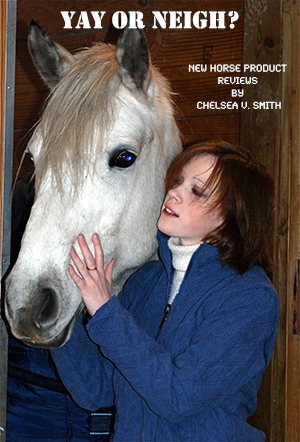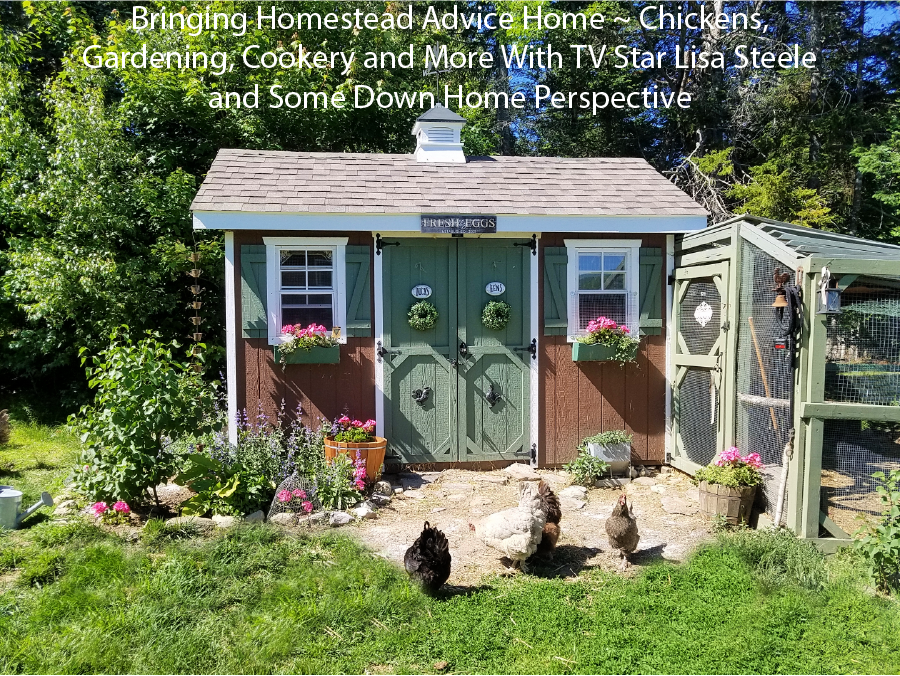Bringing Homestead Advice Home ~ Chickens, Gardening, Cookery and More With TV Star Lisa Steele and Some Down Home Perspective
by Nikki Alvin-Smith
Rural lifestyle often includes keeping chickens, vegetable and flower gardening, and a myriad of other homestead pursuits. Some projects are aimed at self-sufficiency, and some are just plain fun to undertake and accomplish and really don’t do much otherwise to elevate the production net income on the farm.
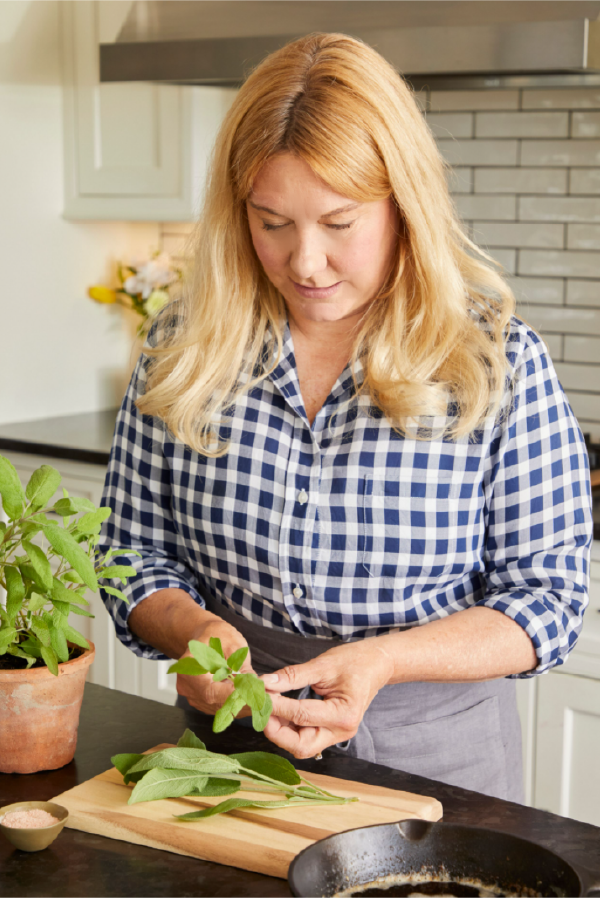 NBC and Create TV Star Lisa Steele, has a wealth of great information to share based on her own life experiences. Lisa is a Master Gardener, 5th Generation Chicken Keeper, accomplished Coop to Kitchen cook and book author, and host of the latest ‘hot’ broadcast on farm life, “Welcome to My Farm,” now filming its 2nd series.
NBC and Create TV Star Lisa Steele, has a wealth of great information to share based on her own life experiences. Lisa is a Master Gardener, 5th Generation Chicken Keeper, accomplished Coop to Kitchen cook and book author, and host of the latest ‘hot’ broadcast on farm life, “Welcome to My Farm,” now filming its 2nd series.
She is a familiar face to those that visit FreshEggsDaily.com – and there are a lot of visits as it currently enjoys over 55 million views! As a veteran TV host with 12 years under her belt, Lisa’s friendly face and engaging content yields lots of helpful advice to those setting out on their homestead adventures.
Enjoy this ‘Inside Insight Scoop’direct from Lisa on how combining the pleasures working hard as a farmer and a TV host match up. In this article Lisa shares her news and views with her latest sponsor, Horizon Structures – the nationwide leading producer of modular barns and buildings, a company with which Lisa has long enjoyed a productive relationship that began with her customization of one of their shed structures into a chicken coop.
Inspiring a quality lifestyle is what Lisa is all about. The new TV series ‘Welcome to My Farm,’ takes the viewer along for many adventures off the farm too, as Lisa explains:
“We're still trying to finalize all 8 episodes - so much depends on the weather and our deadlines for turning in the content, but as of now, we're planning:
- visit to a pumpkin farm
- old fashioned Thanksgiving dinner
- visit to the botanical gardens holiday lights
- visit to an alpaca farm
- visit to a donkey rescue and talking to Bartlett Yard about fiber arts and their "mule" (which is a yarn making machine?)
- predator episode and talk with Maine game warden or guide about trapping etc.
- ice fishing trip
- visit to a beekeeper
- potato farming in northern Maine
And of course, each episode will have delicious recipes plus a segment with the chickens, ducks and geese and as many animals as I can pet and feed treats to where ever I go!
Here's the page on my blog with links and more info.
https://www.fresheggsdaily.blog/p/welcome-to-my-farm-season-two.html“
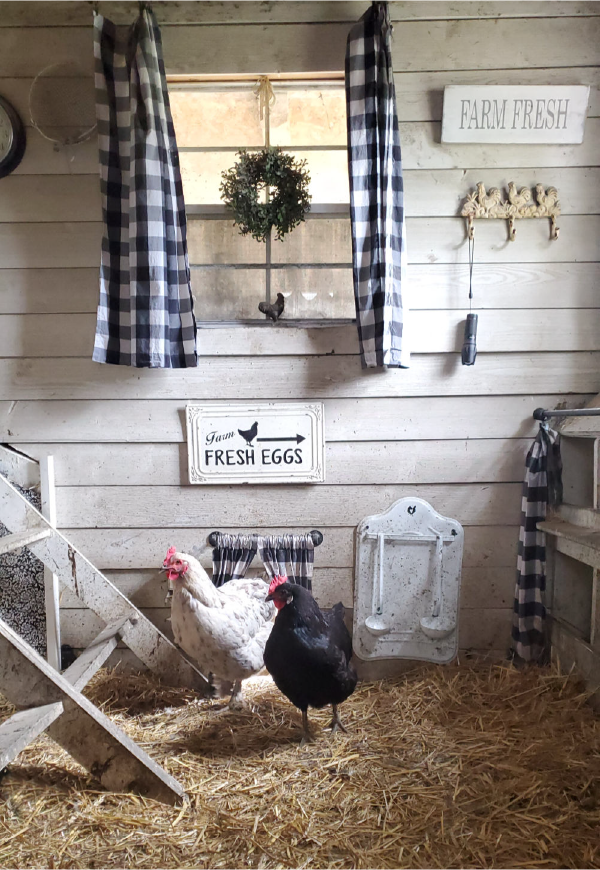 There is lots to learn when it comes to making a success out of homestead development and enjoyment. For the neophyte countryside resident, the adjustment to life in the country can be a stark experience as first winters drop snowfall and chickens, horses or livestock require extra diligent care to see them through the harsh winter weather. Planning is everything when it comes to making life in all seasons better and overcoming the challenges that weather can pose.
There is lots to learn when it comes to making a success out of homestead development and enjoyment. For the neophyte countryside resident, the adjustment to life in the country can be a stark experience as first winters drop snowfall and chickens, horses or livestock require extra diligent care to see them through the harsh winter weather. Planning is everything when it comes to making life in all seasons better and overcoming the challenges that weather can pose.
Some common errors that newcomers to rural lifestyle make when planting their newly booted feet in the country include setting their new house build too far from road access requiring constant time-consuming plowing out of hilly terrain with an obstacle course of fresh plantings too close to the driveways; overlooking the necessity to stock up with enough supplies such as wood, wood pellets, oil, propane or other heating options; hay and feed; making provision for winter water tanks and water supply options for animals kept outside; vermin control for barns and buildings; lighting for outside structures and access points; mulching protections for garden areas; and the list goes on. And that’s just winter worthiness plans. There are a multiple of obstacles to be overcome for every season.
The romance of country lifestyle often conflicts with the reality, as many new settlers from town to country can attest. It fades fast as the long sunny days with cool breezes dip below the horizon to be replaced with biting cold winds, damp dreary days of rain and snow.
In some areas the diminished winter hours kept by restaurants for dining options and limited ‘non snow’ athletic events exact a toll on individuals previously used to a more urban existence with a busy lifestyle driven by multiple options for family activities close by.
In Upstate New York, and most certainly other regions, the recent pandemic sent many town dwellers scurrying to escape to the country where distance from neighbors and a simpler lifestyle beckoned. Sadly, though much development is seen in rural areas because of the recent influx of money and motivated buyers of land and housing, the likelihood is that there will be an extensive exit of many these migrating homeowners from the rural regions, as the reality of country life set in.

Once the romance of country life is set aside, the idealistic notions that drove many folks down the country lane litter the byway as newly purchased trucks, UTVs and SUVs are switched into reverse gear headed back to the civilization their owners are more accustomed to handling.
Successful navigation of a country lifestyle is possible. When asked what the biggest misconception in her opinion that folks have about country life this is what Lisa has to say:
“I think people believe that you need a lot of land to raise animals or grow your own food. And I don't think they realize how relatively inexpensive land and a farmhouse can be out in rural areas. We pay less taxes on 300 acres here in Maine than my Mom does on a house half the size on barely an acre in Massachusetts. I wish more people would research areas they might like to move to and look at some of the farm listings. They are much more affordable than they think. And for those who want to continue living in a suburban or slightly rural area, raising half a dozen chickens, and growing an herb garden for example doesn't take much space at all.
And people should know that you don't have to do it all. If you don't want to raise chickens, don't raise chickens, instead find a neighbor who does and buy eggs from them. Don't like canning? Fine, you don't need to do that either. You can pick and choose the things that you want to do. Barter or trade or buy local for the other things. Social media can give the impression that these "homesteaders" are raising every type of livestock under the sun, making milk and cheese, canning, and preserving every vegetable known to man. Just pick the things you enjoy doing or are good at. Every little bit makes you more self-sufficient and is good for the planet.”
As far as what Lisa finds the hardest thing about living a country lifestyle herself, Lisa didn’t have to think twice:
“Predators. Definitely predators. Keeping animals safe from predators is something that I battle every day. And anyone who raises livestock, whether it be chickens, sheep, cows, battles. There are predators everywhere and they only have to "win" once for you to lose your entire flock.”
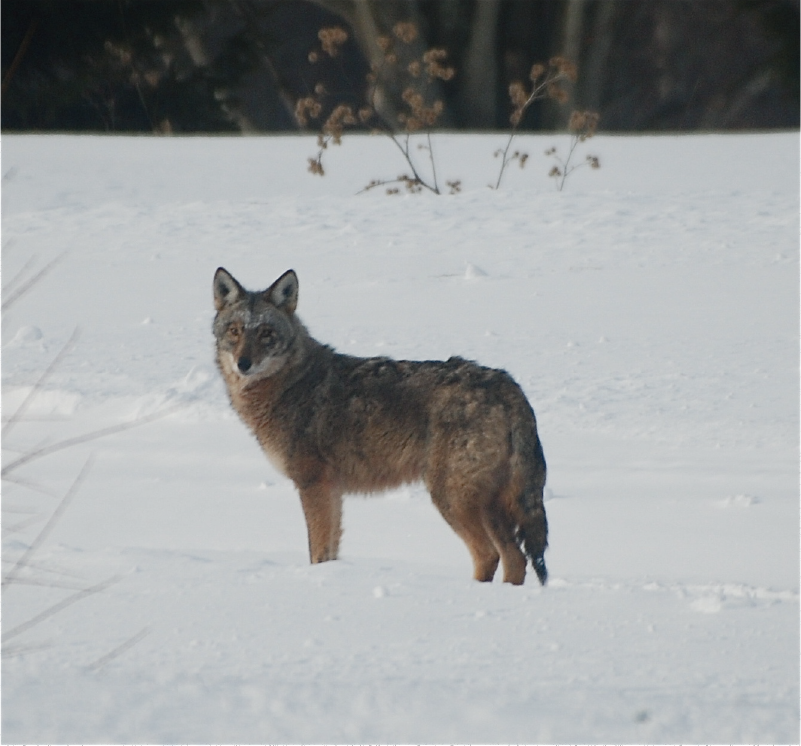
A sobering epitaph to a common homesteading effort that no one wants to experience.
Whatever homesteading options and obstacles the newcomer takes on, there is likely a good neighbor or two handy that is willing to step in and provide help and advice. The bonus of rural living is that while folks may live a distance away from each other in terms of mileage, in their hearts most people brought up or happily ensconced in the country want to see their new neighbors succeed.
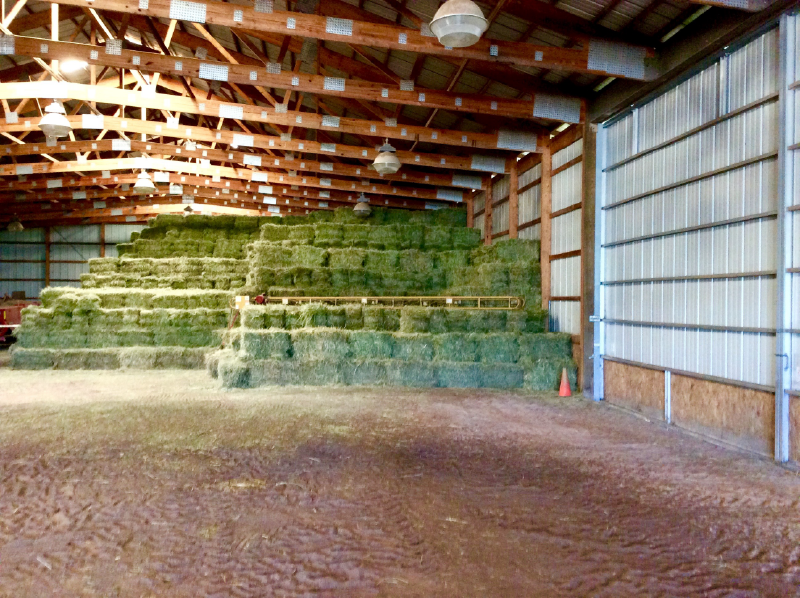
“As producers of high-quality organic hay that we grow and harvest for horses, we are often contacted by people sourcing hay for their milking goats, alpacas, and other smaller livestock as well as horses. I am always happy to explain the difference between first and second cut hay and types of grasses and to educate folks as to how the seasonal crop is harvested and what they should look for to determine that their hay purchase is ‘clean and green’ meaning weed free and cured properly while fresh,” says Paul Alvin-Smith of Willowview Hill Farm in Stamford, NY.
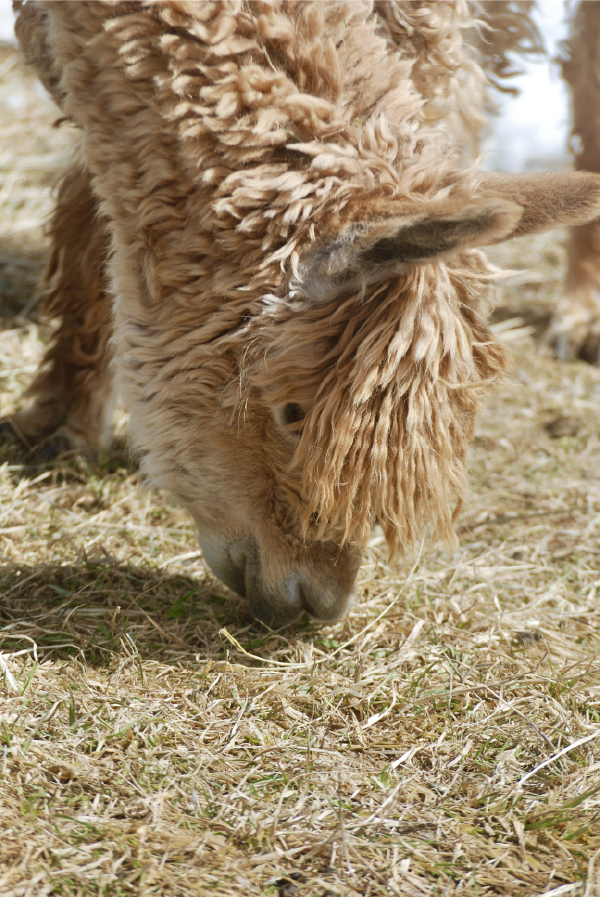 “Passing along knowledge that can save folks money and angst down the road, dealing with sick animals and hay wasted and discarded by their animals for being unpalatable is all part of what we do. When a neighbor slides their car or truck off a slippery icy road in a ditch, they know they can call me, and I’ll bring the tractor and pull them out. I even pulled out a tractor trailer once. A bit ironic really as the driver was a Canadian and used to snowy roads, but he had never driven his rig anywhere but from interstate to interstate from ramp to ramp. If I can’t figure out why a tractor won’t start, I can call my neighbor who is a mechanic and he’ll pop over and give it a look. When a tree falls down my neighbor can’t use, they’ll offer it up to me for firewood if I’ll cut and clean it up. When a farmer across the valley had his well pump go out and had animals to water, I was happy to provide him with water from one of our wells. Country life is awesome, and there is a lot of give and take involved.”
“Passing along knowledge that can save folks money and angst down the road, dealing with sick animals and hay wasted and discarded by their animals for being unpalatable is all part of what we do. When a neighbor slides their car or truck off a slippery icy road in a ditch, they know they can call me, and I’ll bring the tractor and pull them out. I even pulled out a tractor trailer once. A bit ironic really as the driver was a Canadian and used to snowy roads, but he had never driven his rig anywhere but from interstate to interstate from ramp to ramp. If I can’t figure out why a tractor won’t start, I can call my neighbor who is a mechanic and he’ll pop over and give it a look. When a tree falls down my neighbor can’t use, they’ll offer it up to me for firewood if I’ll cut and clean it up. When a farmer across the valley had his well pump go out and had animals to water, I was happy to provide him with water from one of our wells. Country life is awesome, and there is a lot of give and take involved.”
The North-East USA has become a mecca for development as business owners of companies large and small. Everyone from the giants of Silicon Valley to heritage winegrowers, from the alternative medicine service providers to the illuminated creatives are heading back East instead of going West (the expression ‘Go West’ may not mean what you think it does).
The Capital region of New York has seen a marked increase in recent years of depressed urban areas being purchased ‘en masse’, street by street, by the moneyed Westerners retreating from wildfires, parched soils, and water supply issues. The new ‘climate haven’ has some surprises for those less used to the vagaries of Mother Nature on the East Coast.
The net result of the migration both to the cities of the North-East and urban areas, brings even more ‘well-heeled’ purchasers to the bucolic country that surrounds these regions.
While those with second homes quickly made them primary residences during the pandemic, there are many more willing to make a complete change in location and lifestyle to live a better life.
This necessarily places strain on the existing rural town and village tax base, school and medical systems and forces land and house prices into the realm of ‘never’ for local first-time homeowners looking to enter the market and stay close to where they grew up.
Homesteading may not be for the faint of heart, but there are good reasons to try as the rewards can be great. Community spirit, a healthier and more active lifestyle, the satisfaction, and value of growing and harvesting a product or two or three rather than commercial consumerism are just some of the benefits of stepping out of the fashion footwear and into a pair of wellies.
There is government help available for the homesteader or small business entrepreneur to explore to help leverage financial support for their endeavors. Social media platforms are a good resource with many groups available to help secure resources and garner information. A good place to start is at County pages, and ‘Growing or Strengthening Business’ groups.
Other ‘help’ comes in the form of providing affordable means to protect and enhance the land. For example, many counties in the New York Watershed area such as Schoharie, run a Soil and Water Conservation Tree Program, aimed at providing small quantities of stock for home use to develop and protect the landscape.
The most common complaints heard from newcomers to country lifestyle is that there is nothing to do or that they have been made to feel unwelcome.
The reality is that there are plenty of events and activities to enjoy but you do need to research them a bit harder as you won’t see them lined up along one main road. Once again social media can be a superb resource. For example, Facebook group Meanwhile in the Catskill Mountains of New York. The group is run by this magazine, Catskill Horse – developed as a community resource over a decade ago to address this issue. As indeed so was the magazine itself, though its reach to over 100,000 viewers per month now extends up and down the Eastern Seaboard and even further afield.
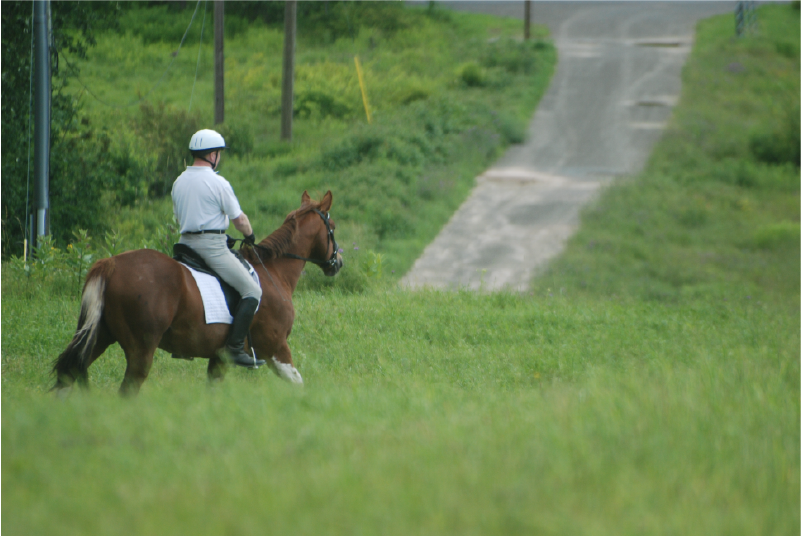
If you ask most lifelong resident of country villages if they welcome newcomers, they will likely say they do, but there may be caveats and some undeniable resentment too. As a neighbor of mine once put it,
“People are welcome to come live here, but they shouldn’t try and make our area like the one they came from. Building houses all over, clearing woods, fencing everything, opening restaurants nobody local can afford to visit and making rules for everyone else. We were quite happy here before they came and will be again after they leave.”
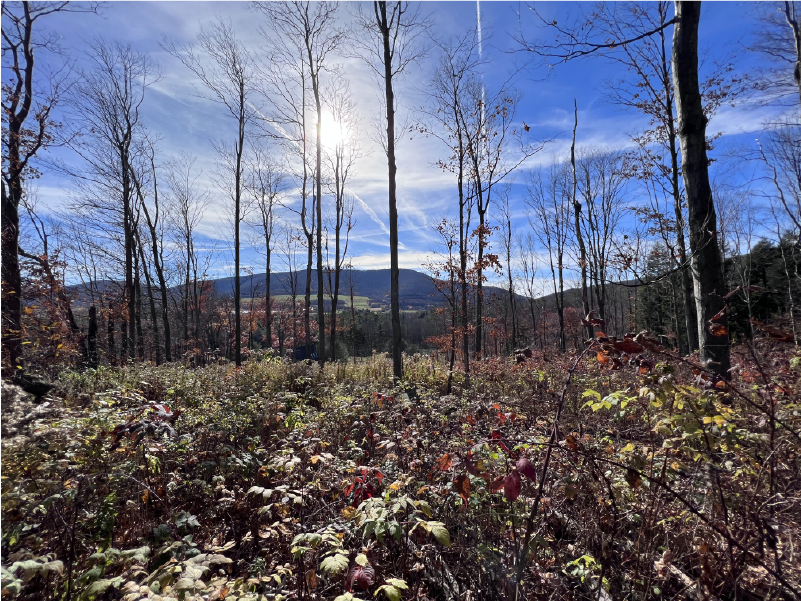
So ‘Live and Let Live’ may be a good mantra to adopt when moving to the country after all. Though seeing the tracks in the snow of a bobcat stalking the coop or the nighttime noise of a pack of coyotes making a kill may give pause for thought.

